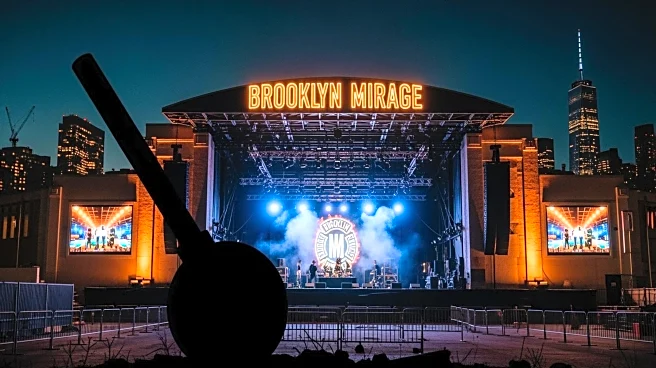What's Happening?
The Brooklyn Mirage, a prominent open-air concert venue in East Williamsburg, Brooklyn, is set to be demolished following financial difficulties and a failed reopening attempt. The venue, part of the larger
Avant Gardner complex, faced issues after its temporary occupancy certificate was revoked due to safety and technical concerns. These included inadequate accessibility, insufficient toilets, and lack of automatic fire sprinklers. The venue's parent company, Avant Gardner, filed for Chapter 11 bankruptcy in August, citing the closure as catastrophic for its finances. Bankruptcy records reveal debts exceeding $10 million, including $1.8 million owed to DJ Black Coffee Entertainment. The demolition is estimated to cost $1.5 million.
Why It's Important?
The demolition of Brooklyn Mirage highlights significant challenges in the live music and entertainment industry, particularly for venues struggling with financial management and regulatory compliance. The closure impacts local businesses and artists who relied on the venue for performances and events. The bankruptcy and subsequent asset sale may affect creditors and stakeholders involved with Avant Gardner. This situation underscores the importance of adhering to safety regulations and maintaining financial stability in the entertainment sector, which can have broader implications for event planning and venue operations across the U.S.
What's Next?
Avant Gardner is in the process of selling its assets to an affiliate of its lender, with a hearing for the sale scheduled for October 22. The company aims to stabilize its finances and potentially reopen the Mirage in 2026. The outcome of the asset sale and bankruptcy proceedings will determine the future of the venue and its impact on the local entertainment scene. Stakeholders, including creditors and local businesses, will be closely monitoring these developments.
Beyond the Headlines
The situation with Brooklyn Mirage raises questions about the sustainability of large-scale entertainment venues in urban areas, especially those facing regulatory and financial hurdles. It also highlights the need for effective crisis management and strategic planning in the entertainment industry to prevent similar occurrences.









